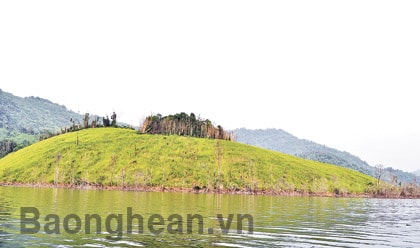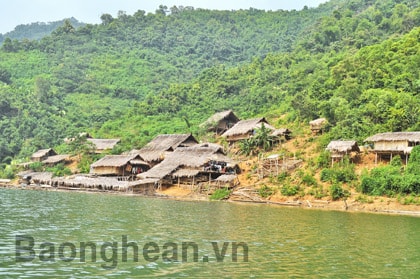Need to clarify responsibilities, point out causes, and thoroughly resolve
Part 3: GOING AGAINST POLICY, VIOLATING THE LAW
Part 3: GOING AGAINST POLICY, VIOLATING THE LAW
(Baonghean) -Refusing to relocate, they returned to the Ban Ve Hydropower Reservoir, making a living by encroaching on forest resources - This behavior not only puts them in a dead end facing many dangers but also goes against the Party and State's policies on resettlement and migration, violating the Law on Residence.
>>Part 2: LIFE FLOATING ON THE LAKE
The households we are referring to are 33 households in Cha Coong village (formerly Huu Duong commune, Tuong Duong district) who are still stubbornly refusing to move to the land reserved for them in the Cha Coong 2 resettlement area, Thanh Son commune, Thanh Chuong district. Over the past few years, they have established their own community and lived in the Ban Ve Hydropower reservoir. The second group of residents, 245 households and 614 people, had moved to resettlement areas in Thanh Chuong but have returned to Tuong Duong, mainly to the reservoir area to clear forests for farming and fishing. Among these households, it is noteworthy that 36 households, 164 people live in 10/30 villages, each village has 1-2 households, but mainly concentrated in Kim Hong village (Ngoc Lam commune). 25/102 households, 117 people have sold their houses in resettlement areas (the number of households returning above is based on the report of Thanh Chuong district as of October 1, 2012, but the specific number that we have calculated after finding out information in the locality is that there are about 47 households that have sold their houses in resettlement areas).

The protective forest of Ban Ve Hydropower Reservoir was turned into rice fields by resettled people.
After the relocation, the communes in the Ban Ve Hydropower Reservoir area were officially erased from the administrative map of Tuong Duong district, and the seal was also revoked by the superior agency. In that situation, the number of stubborn households staying, specifically 33 households in Cha Coong village, during the past time, had no administrative management agency. From here, many issues were raised regarding human resource management and security, order, culture and society in the area. Luong Van Ngoi and Quang Thi Huong gave birth to Luong Sy Dang in 2011 but had to flee to Tam Dinh commune, the wife's hometown, to register the child's birth. They would have to suffer many disadvantages if they continued to reside illegally in the reservoir, however, when asked if the family would move to the resettlement area in Thanh Chuong, Ngoi and his family all answered: "No!". Staying is not only a disadvantage for themselves and their families, but they also violate the Law on Residence in the area that has been cleared to serve the project, while these households are arranged to move to a place with many conditions to ensure better living and production than their old place of residence, but they do not accept it, causing the State's policies and guidelines to not be implemented decisively and are causing many complicated social consequences. That is, there is no public authority to manage, exercise State power, regulate and resolve social relations in the community. Furthermore, this could be a "fertile" ground for reactionary forces to exploit to sabotage, cause division in the great national unity bloc; blacken the regimes and policies for the people of our Party and State...
Knowing that it was a violation, there were people who deliberately organized the construction of solid houses. That was the case of Mr. Luong Khac Phung, who was the head of Cha Coong village in 2008-2009. When we contacted him, Mr. Phung said: "People want to stay in their old hometown to make a living. But if not, they will accept resettlement, as long as the land for production is guaranteed and is suitable for the people's customs and practices, and all support, compensation, and land acquisition policies are completed." Mr. Phung said one thing, but he did another. He mobilized forces to dig mountains, build solid houses, and was determined to "live for life" right in the reservoir area. It should also be added that Mr. Phung was a party member and the head of the village during the final migration period, but from the beginning, not only did Mr. Phung not set an example in implementing the State's policies and guidelines, but he also incited a part of the people to violate and oppose the migration to the end. He also filed a complaint to the Central Government about the compensation, support, and compensation for land acquisition and clearance, while Mr. Phung himself and less than 1/3 of the households in Cha Coong village (old) did not fully fulfill their obligations and commitments to the government and the project. Among the many resettlement and resettlement options that they had the right to choose, Mr. Phung and the remaining households chose the resettlement option in Thanh Chuong and they voluntarily signed the commitment. The investor, the Management Board of Hydropower Project II, also built infrastructure and arranged resettlement land. However, these households arbitrarily broke their initial commitment, going against the general policy of the State, and then abandoned themselves in the isolated space of the reservoir area.

33 households in Cha Coong village
residing illegally in the lake area.
The remaining population living in the reservoir area are households who “parachuted” back from resettlement areas in Thanh Chuong. These people arbitrarily cleared the forest to build houses, formed clusters of villages in the protected forest area and accepted a nomadic life with many uncertainties. Up to now, the entire reservoir area has up to 22 illegal residences, the most of which are “parachuted” people from Kim Hong village, they “landed” at 5 locations around the reservoir area along Sop Xuan, Ca Muc, Tang streams… In the protected forest area, these households arbitrarily built huts, established villages, cleared forests for farming, causing difficulties for forest management and protection. Mr. Le Phung Thieu - Director of Tuong Duong Protective Forest Management Board said: "In the protective forest area, people returned to destroy the forest to plant cassava, rice, and corn. Faced with this situation, the board had to set up 2 checkpoints to prevent and repel them. In 2011, Cha Coong people decided to take a risk by "parachuting" to establish a new village right in the protective forest area. The district mobilized 100 militiamen from Thach Giam, Xa Luong, and Yen Hoa communes to stay in the forest for a whole month to repel them before they retreated."
If we look at it objectively and comprehensively, the lives of thousands of households in Thanh Chuong new countryside are gradually stabilizing. A small number of people, due to their awareness or being incited and lured by bad people to stay and return to the reservoir, are leading themselves and their families down the wrong path, with a dead end in the future. Not only that, they are deliberately going against the State's policies and deliberately violating the laws on Land Law, Forest Protection and Development Law and Residence Law, and at the same time complicating the situation. Therefore, in addition to mobilizing and persuading, it is necessary to have a form of handling the law violations of some leaders and instigators, thereby stabilizing the people's thinking and moving them out of the reservoir area.
Master, Lawyer Nguyen Vinh Dien, Vinh Dien & Associates Law Office, Vinh City, Nghe An Province:The number of households in Cha Coong village and some households who sold their houses in resettlement areas in Thanh Chuong and returned to the Ban Ve Hydropower Reservoir, Tuong Duong district, who entered the forest to build huts, encroach, and destroy forests for farming in the protective forest area of Tuong Duong district is an act of encroachment, land occupation, illegal deforestation, illegal destruction of forest resources, illegal encroachment of forests, and violation of the provisions of Article 15 of the 2003 Land Law; Article 12, Article 85 of the 2004 Law on Forest Protection and Development. Depending on the nature and severity of the violation, they may be subject to administrative sanctions or criminal prosecution. In addition, these residents also violated the 2006 Law on Residence because their current place of residence is illegal.
(To be continued)
PV Group






